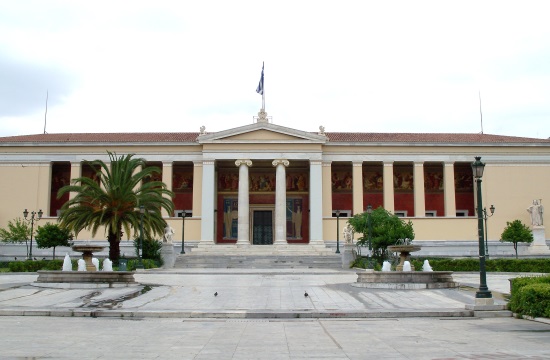Grecia/Mayo de 2017/Fuente: Tornos News
Resumen: Las universidades de Grecia y otros institutos de educación terciaria generan la investigación más original del país, según un informe del Centro Nacional de Documentación (EKT) publicado el miércoles. A pesar de que su participación en la actividad total de I + D supera el 35%, lo que la convierte en una de las más altas de la UE, su contribución a la innovación ya la economía nacional sigue siendo limitada. También hay un alto grado de dependencia de la financiación estatal, aunque cada vez más buscan fondos de fuentes alternativas y revisan las estrategias de financiamiento. El informe también señaló que el gasto nacional en I + D ha aumentado en los últimos años, a pesar de la caída de los índices macroeconómicos en muchas áreas. Esto se debe principalmente a la absorción de los fondos del Marco de Referencia Estratégico Nacional (QREN), a pesar de que Grecia sigue siendo la más baja entre los Estados miembros de la UE. Sobre la base de las estadísticas más recientes disponibles (para 2015), la tasa de gasto en I + D fue de 0,96% del PIB.
Greece’s universities and other tertiary education institutes generate the most original research in the country, according to a report by the National Documentation Centre (EKT) released on Wednesday.
Even though their share of total R&D activity exceeds 35 pct, making it one of the highest in the EU, their contribution to innovation and the national economy is still limited, however. There is also a high degree of dependence on state funding, though they are increasingly seeking funds from alternative sources and reviewing financing strategies.
The report also noted that national spending on R&D has increased in recent years, in spite of falling macroeconomic indices in many areas. This is mainly through the absorption of National Strategic Reference Framework (NSRF) funds, even though Greece continues to rank low among EU member-states. Based on the most recent statistics available (for 2015) the rate of R&D spending was 0.96 pct of GDP.
Of the domestic businesses that innovate with respect to products or procedures, 10.5 pct have entered into some form of cooperation with a Greek university or research foundation.
The number of Greeks with doctorates has also increased since the mid-2000s, with Greece ranking among the top 10 countries for the number of PhD holders per 1,000 population.
The so-called ‘European Paradox’ – namely a discontinuity between the generation of high-level research results and the ability to exploit these commercially – appears to be even more evident in Greece, while the contribution of Greek businesses to total national R&D spending is markedly lower than in other countries (0.28 pct of GDP, compared to a European average of 1.3 pct of GDP). This indicates an ineffective use of research results by the real economy and production.
This is also reflected in the low number of patent applications submitted by Greek businesses to the EU, which account for only 0.1 pct.
Fuente: http://www.tornosnews.gr/en/greek-news/society/25233-survey-universities-do-most-research-in-greece-with-limited-commercial-impact.html







 Users Today : 6
Users Today : 6 Total Users : 35459912
Total Users : 35459912 Views Today : 6
Views Today : 6 Total views : 3418471
Total views : 3418471